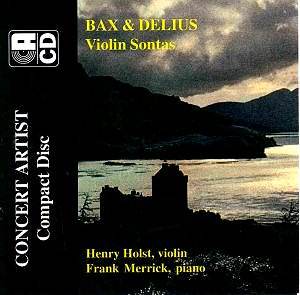This
is a historic recording of the Bax and Delius works. Why historic?
Because when made in the 1960s neither work was commonplace on
radio or in the concert hall. Rare birds indeed. In the intervening
four decades things have changed substantially. We now have McCabe
and Gruenberg on Chandos and Mei Wu Loc on ASV. Of these two the
Chandos still sounds strangely synthetic and airless - a curse
also visited on those early Chandos CDs of the first three symphonies.
The two ASV discs are the ones to get. The present CD has the
same clamant virtues as the Handley-revived 1960s recordings of
the Symphony No. 4 and Symphonic Variations. These show
how Bax rose from dust and disdain through the enterprise of small
labels and passionate well-informed performer-advocates able to
communicate the Bax message with an evangelist's zeal.
The
Bax First Sonata is a large work across three movements.
Its attributes are Celtic and Russian ... not completely synthesised.
Bax's own special solution came after the First Symphony. This
does not however stop the writing in this sonata from being vibrant
and often poetic. Bax was always a potent imaginer of melody overpowering
when coupled with the impulsive and tumultuous playing of Henry
Holst (who in the 1940s gave the UK premiere of the Walton Violin
Concerto). Holst's tone is feverish, a shade nasal and fully alive
to the restless nature of this music. The sonata also offers an
idyllic cradling as in the lovingly calculated pacing of the start
of the third movement. The sonata fades most magically in the
hands of these artists into a sleepy heat-haze. Merrick and Holst
were to record the other two Bax violin sonatas and various of
the short pieces for violin and piano but these were for Frank
Merrick Society LPs. The masters of those recordings are presumably
lost - more's the pity.
The
Second Delius Sonata is one of four. This belongs to 1915
and is typically rhapsodic and, less typically, full-blooded.
It can be thought of as, in some measure, like the Howells’ First
Sonata, the Goossens’ First and the Second Sonatas of Thomas Dunhill
and John Ireland - all broadly contemporary. Much the same can
be said of the unusual Violin Sonata by the Swedish composer Moses
Pergament. Holst and Merrick are at their least fluent in the
melodic continuum that is the Delius Second Sonata than in the
volatile romanticism of the Bax work.
The
detailed notes are by Peter J. Pirie advocate extraordinaire of
Bax and Bridge and much maligned for his provocatively opinionated
Gollancz book on the 'British Musical Renaissance' (1979).
The
Revolution, Fidelio and Concert Artist catalogues were the home
of many British works. I remember fondly the LPs of the Bliss
and Bax Viola Sonatas (Herbert Downes/Leonard Cassini Delta 12028
and Revolution RCB1), the Ireland First Violin Sonata and Cello
Sonata, not to mention another of the Elgar Piano Quintet with
a short piece for viola and piano by Bax (Summit LSU3058). Perhaps
these too will surface? If they do and come under the expert remastering
accorded here we are assured of hiss-free listening and a secure
and vibrant sound. There was a boxiness to the acoustics of these
recordings which is not entirely eliminated by the technical wizardry
applied. My only real quibble with this CD is its playing time.
Such a pity one of the other Revolution LPs could not have been
'cannibalised' perhaps so as to include the Watson Forbes/Leonard
Cassini version of the Bax Viola Sonata and the Legend,
also for viola and piano.
Rob
Barnett
MusicWeb
can offer the complete
Concert Artist catalogue
